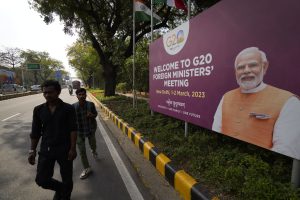On September 9, the most powerful heads of state will meet in India for the annual G-20 Summit. It is crucial that these leaders call on India to respect the rights of its minorities and seek the support of human rights defenders, rather than silencing them. Not doing so will be detrimental for the possibilities for G-20 members to jointly solve today’s challenges, the lives of these people, and the future of democratic India.
As we previously argued in The Diplomat, Hindu nationalist ideology shines through in several places in India’s G-20 presidency. Nilanjan Mukhopadhyay too has criticized the Indian government’s use of the G-20, which he argues has helped India secure international legitimacy and widespread recognition despite human rights violations. But apart from the Indian government appearing to use the G-20 to whitewash its human rights violations, it appears to also have had a disquieting stranglehold on G-20 discussions.
It is telling that of the Indian Y-20 delegates, and the youth that make up the secretariat, not a single participant is Dalit – an “untouchable.” As the Indian secretariat of the different G-20 working groups play a significant role in setting the agenda, leaving out their voices from the agenda-setting of the Y-20 discussions ignores the concerns and solutions of a large population.
Even those delegates who attempt to bring forward critical views have been quickly reminded of their place: Ashish Kothari explained how he was instructed to self-censor his remarks in a panel on biodiversity. Critical statements on the G-20, he was told, would not be tolerated.
The Indian government seems adamant that only the most carefully curated discussions reach the public. Delhi will not only shut down for security purposes during the G-20 Summit in September, but its law enforcement agencies have also done their best to ensure that no other meetings can take place even in the weeks before. On August 19, Delhi Police prevented people from entering a meeting venue in New Delhi where a civil society meeting critical of the G-20 summit took place, citing that the organizers did not have “permission” for the event. At the People’s 20 Summit, which one of us attended on August 23 in Delhi, police filmed everything without seeking permission from organizers.
In March 2023, over 100 NGOs, scholars, activists, and journalists issued a statement in which they critiqued India for not using its G-20 presidency to promote solutions toward justice and sustainability. Instead, they wrote, the government of Prime Minister Narendra Modi has been using the G-20 “as an opportunity to seek political and electoral gains before the upcoming national elections.” In fact, India asked to postpone its presidency to 2023, conveniently shifting it to the year directly preceding general elections.
India’s attempt to use the G-20 for Modi’s personal electoral gains is blatantly apparent in the G-20 posters, for instance, which are plastered across cities with the dedication of election campaigning. The G-20 logo, which with its lotus and color scheme is oddly reminiscent of the BJP’s logo, is often joined by a picture of Modi.
Academics and civil society have for several years warned that India is increasingly autocratic. The 2023 report by the Swedish Varieties of Democracy (V-Dem) Institute ranked India as an “electoral autocracy,” and India has slipped to a rank of 161th out of 180 – lower even than Afghanistan – in Reporters Without Borders’ Press Freedom Index. The Indian government systematically curtails and increasingly criminalizes the operation of reputed civil society organizations, not only leaving them no say in the policy process, but even framing their proposals as anti-Indian.
On the eve of the G-20 Summit in Delhi, one thing is blatantly clear: Rather than setting an agenda that would put forward the voices of the Global South and the world’s most marginalized, the Modi government has used India’s G-20 presidency to promote its prime minister’s election campaign, legitimize exclusion, and whitewash its tilt toward authoritarianism.
































